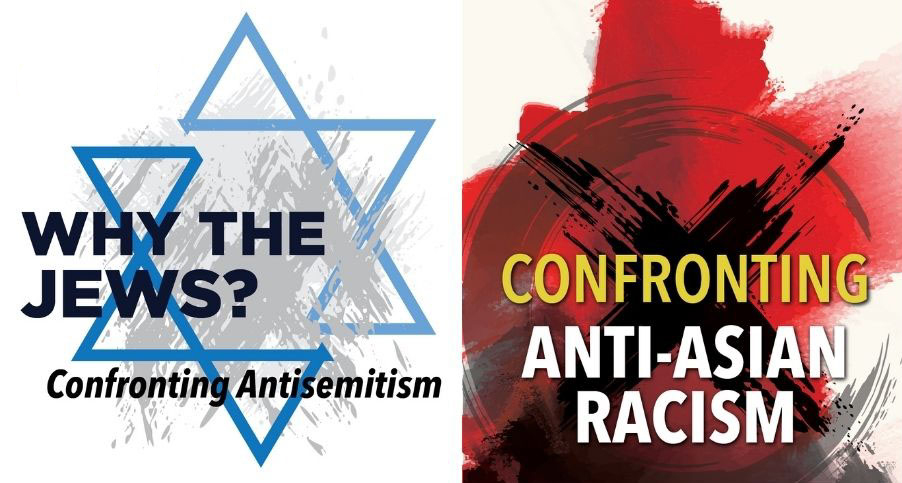Following on the success of pop-up courses on topics like anti-Black racism and the COVID-19 pandemic, UConn is offering its students two new courses for spring 2022.
This semester’s pop-up classes are “Confronting Anti-Asian Racism”, which is being offered now through March 4, and “Why the Jews? Confronting Antisemitism”, which will run from March 7 through April 29. The one-credit courses are taught in an asynchronous format, allowing students added flexibility.
Pop-up classes are taught online in a multidisciplinary and integrated fashion by faculty from various schools and colleges. The classes focus on important contemporary topics and give students core knowledge on a subject with opportunities to continue exploration beyond the course.
“These two topics are relevant, contemporary, and important to the UConn community,” says David Morrow, the Assistant Director of eLearning for the Center for Excellence in Teaching and Learning (CETL). “In light of recent events, these courses are more important than ever. We feel these courses align with UConn’s initiatives on diversity, equity, and inclusion and the hope is that they contribute to an overall culture of acceptance and understanding.”
The lead faculty for the Confronting Anti-Asian Racism course are Jason Oliver Chang, Associate Professor of History and the Director of the Asian and Asian American Studies Institute, and Na-Rae Kim, Assistant Professor in Residence and the Associate Director of the Asian and American Studies Institute.
“The Confronting Anti-Asian Racism course serves as the briefest of introductions to Asian American history covering a diverse set of ethnicities,” says Chang. “Spurred by the surge in pandemic-related discrimination and violence, this generation is learning how the political and cultural invisibility of Asian Americans contributes to their vulnerability. Being the fastest-growing racial group in the country and largest non-white group of faculty, staff, and students at UConn, Asian Americans are working to be included in conversations of racial justice.”
These classes encourage students to think critically about how things interact, not through just one lens like history, sociology, English, or science, but through many difference lenses. — Eileen Stuyniski, Assistant Director of Instructional Design at CETL
For the Why the Jews? Confronting Antisemitism course, the lead faculty member is Avinoam Patt, the Doris and Simon Konover Chair of Judaic Studies and Director of the Center for Judaic Studies and Contemporary Jewish Life.
“We are offering this course at a critical time in our history,” says Patt. “We have witnessed a disturbing trend that has seen a rise in antisemitism, racism, and extremism globally, nationally, and locally, with incidents everywhere, even here on our campus. There is no simple explanation for why this has happened. Antisemitism defies logical explanation and yet we must try to understand its origins and its history, in order to learn how best to confront it. At the same time, we do not want Jews, Jewish history, and Jewish culture to be defined only through the lens of antisemitism. For this reason, we hope students will come away from the class with a better understanding of the diverse nature of Jewish identity and tradition from antiquity to the present.”
Pop-up courses are truly a cooperative effort at UConn, and through the multidisciplinary, integrated approach to teaching them, faculty members can collaborate and connect in ways they typically don’t get the opportunity for in the course of their normal teaching responsibilities. Faculty from areas like history, political science, and sociology are involved in the course development, but the courses also include elements from the visual arts, music, and poetry.
“These classes encourage students to think critically about how things interact, not through just one lens like history, sociology, English, or science, but through many difference lenses,” says Eileen Stuyniski, Assistant Director of Instructional Design at CETL. “That’s an important competency to teach students – to look at a problem from more than one perspective, because these pop-ups address contemporary issues and problems that society is facing.”
CETL has been the coordinating point to develop each of these pop-up courses in partnership with several offices across the University including: the Office of the Provost; the Registrar; the Bursar; Financial Aid; ITS Accessibility; the Library, and the Interdisciplinary Courses Committee.
UConn debuted pop-up courses in spring of 2020 with a class on the COVID-19 pandemic, which enrolled over 4,000 students – the largest in the history of the institution. Since then, pop-ups have been offered on Anti-Black Racism and the Climate Crisis. Overall, pop-up courses have had a combined enrollment of nearly 14,000 since their beginning in spring 2020.
The long-term plan is to offer two pop-ups a semester – one being a repeat topic and another being a new subject. The classes will be offered in different halves of the semester to give students the opportunity to take each class.



